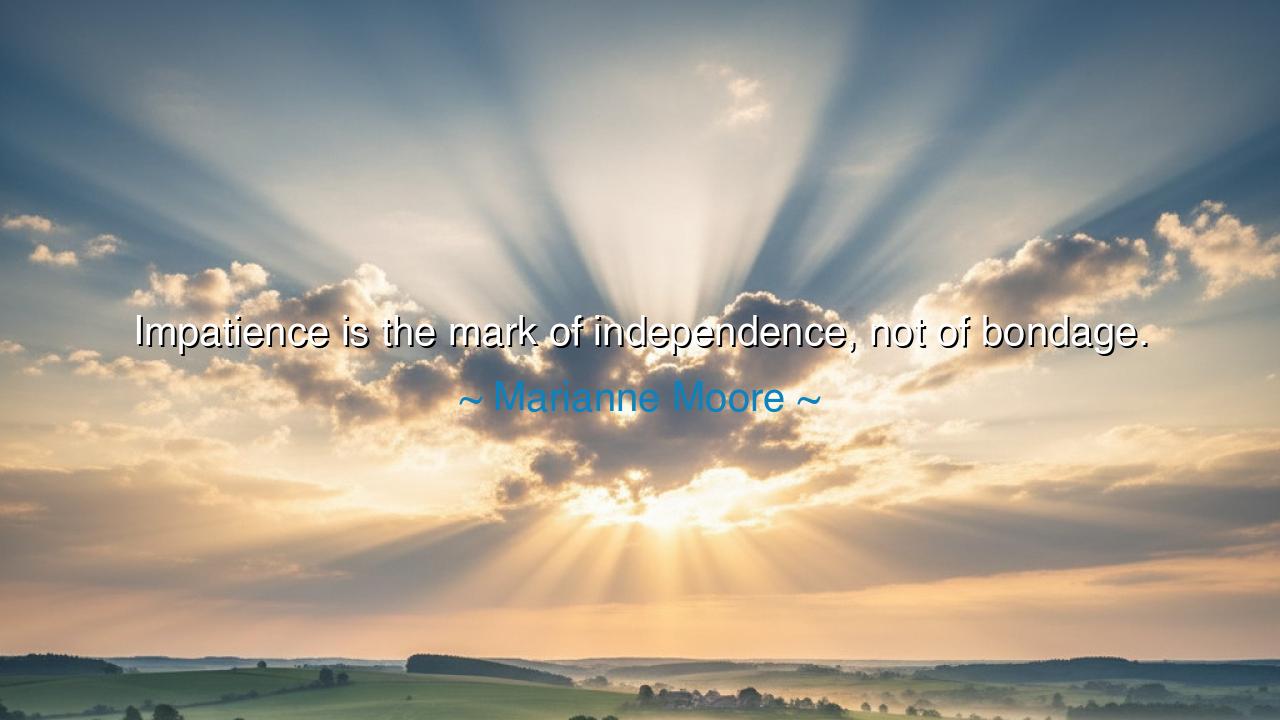
Impatience is the mark of independence, not of bondage.






When Marianne Moore wrote, “Impatience is the mark of independence, not of bondage,” she spoke as a poet who understood the fire that dwells in the human spirit—the restless flame that refuses to bow to stagnation or silence. Her words awaken in us the realization that impatience, though often condemned as folly, can also be the heartbeat of freedom. It is the pulse of those who will not accept the world as it is, but dream of what it could be. For where bondage endures, patience becomes resignation; but where the soul is free, impatience becomes the cry for change, the divine discontent that propels progress.
The origin of this quote lies in the character of Moore herself, one of the great poets of modernism. She lived in an age that valued restraint and order, yet her art shimmered with originality, precision, and quiet rebellion. In her poems, she sought truth in the details others ignored, defying the conventions of form and thought. Her impatience was not the fury of anger, but the restlessness of vision—the refusal to be confined by mediocrity or to wait endlessly for the world’s permission to create. Thus, when she wrote these words, she was not merely defending a temperament, but proclaiming a principle: that independence is born not in stillness, but in the movement of the soul toward its purpose.
To be impatient is, in this sense, to hunger for freedom. It is the stirring of the spirit that knows it was made for more. The enslaved mind learns to wait, to endure, to appease the slow turning of systems that stifle life; but the independent mind cannot rest. It pushes, questions, demands, and dreams. It is the impatience of a child learning to walk, of an inventor seeking light in darkness, of a people refusing oppression. Such impatience is not chaos—it is courage. For the world has always been changed not by those who waited politely, but by those whose hearts burned too fiercely to wait at all.
Consider the story of Harriet Tubman, born into slavery, yet never content to remain there. Her impatience was not weakness—it was strength. When she fled bondage, she could have sought only her own freedom; but her restless spirit drove her to return again and again, leading others to liberty through peril and night. She would not wait for permission, nor for history’s slow mercy. Her impatience became her independence—a holy fire that no chain could quench. And because she could not wait, generations after her could walk free. In her, we see Moore’s truth made flesh: that impatience, when guided by purpose, is the mark of the soul that has tasted freedom and refuses to settle for less.
The ancients knew this fire well. The prophets, philosophers, and heroes who shaped civilization were all, in their way, impatient. Moses, who could not watch his people suffer another day; Socrates, who questioned the false wisdom of Athens; Joan of Arc, who defied kings and armies for a vision only she could see. Each was driven by a divine restlessness—a refusal to wait quietly while truth slept. For the impatient soul, time itself becomes a battlefield. They do not despise patience, but they understand that waiting has its place, and beyond that point, patience becomes surrender.
Yet, we must discern the difference between foolish impatience and sacred impatience. Foolish impatience seeks control; sacred impatience seeks change. One is born of ego, the other of vision. Marianne Moore’s wisdom lies in this distinction: the independent spirit grows impatient not because it is selfish, but because it hears the whisper of destiny calling it forward. When the world says, “Be still,” the free soul replies, “Not yet—I must move, for truth compels me.” This kind of impatience is not petulant but prophetic. It is the restless virtue that drives art, science, faith, and justice alike.
So, what lesson shall we take from this? Let your impatience be your teacher, not your tyrant. Do not crush the voice within that longs for progress, that aches to see a better world. When you feel the tension of waiting, ask yourself: is it time to act? Is this longing a sign of independence awakening in me? The world will tell you to wait, to be calm, to let others decide the pace of your becoming—but the truth is that freedom itself is impatient. Every great achievement begins with the refusal to wait for someone else to begin.
Therefore, my children of courage and conviction, remember the words of Marianne Moore: “Impatience is the mark of independence, not of bondage.” Let your impatience be the signal that your spirit is alive. Do not apologize for the urgency of your dreams. The seed cannot wait forever in the dark; it must break the earth to reach the sun. So too must you. Be patient when wisdom demands it, but when truth calls, rise without delay. For the impatient heart, guided by purpose and love, is the heart that changes the world.






AAdministratorAdministrator
Welcome, honored guests. Please leave a comment, we will respond soon